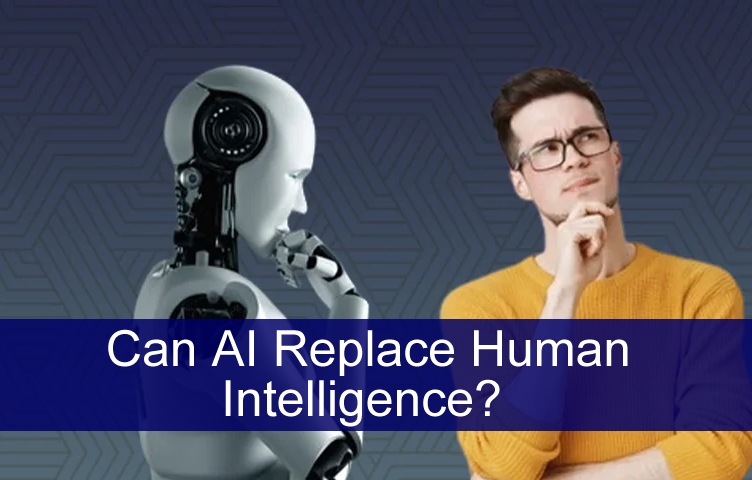Can AI Replace Human Intelligence? this is the question on the mind of many now? The rise of artificial intelligence (AI) has sparked numerous debates about its potential to replace human intelligence.
While AI systems have made significant strides in replicating certain aspects of human cognition, the question of whether AI can truly replace human intelligence is a complex and multifaceted one.

In this article, we will delve into the capabilities and limitations of AI and explore whether AI can entirely replace the unique qualities of human intelligence.
What AI Can Do
AI has made remarkable progress in performing tasks that were once the exclusive domain of human intelligence. Here are some areas where AI excels:
a. Data Processing: AI algorithms can process and analyze vast amounts of data quickly and accurately, which surpasses human capabilities.
b. Pattern Recognition: AI can identify complex patterns in data, leading to applications in fields like medical diagnosis, finance, and fraud detection.
c. Language Processing: Natural language processing (NLP) AI models can understand and generate human language, allowing for chatbots, translation services, and even content generation.
d. Image and Speech Recognition: AI systems can recognize objects in images, transcribe spoken language, and even generate realistic human-like speech.
e. Automation: AI-driven robots and machines have been developed to perform tasks in manufacturing, logistics, and more, reducing the need for human labor.
Limitations of AI
While AI has demonstrated its prowess in specific tasks, it remains far from achieving true human-level intelligence. Here are some of the key limitations:
a. Lack of Common Sense: AI often lacks common-sense reasoning, making it prone to errors in understanding context and nuance.
b. Emotional and Social Intelligence: AI lacks the capacity to feel emotions or exhibit social intelligence, which are essential for human interaction and decision-making.
c. Creativity and Innovation: AI can assist in creative tasks but cannot replicate the depth and breadth of human creativity or inventiveness.
d. Adaptability: AI systems are not inherently adaptable and require human programming and intervention to function effectively in new situations.
e. Ethical and Moral Reasoning: AI does not possess ethical or moral reasoning capabilities, which are crucial for complex decision-making in a moral and ethical context.
The Human Advantage
Human intelligence encompasses a wide range of cognitive, emotional, and social abilities that remain beyond the reach of AI. These include:
a. Emotional Understanding: Human intelligence involves empathy, emotional intelligence, and the ability to connect with others on a deep emotional level.
b. Ethical and Moral Dilemmas: Humans can navigate complex moral and ethical dilemmas, considering cultural, ethical, and societal contexts.
c. Creative Thinking: Humans can ideate, innovate, and create in ways that AI cannot replicate.
d. Adaptation to Novel Situations: Human intelligence can adapt to new and unfamiliar situations, drawing upon a broad spectrum of knowledge and experiences.
e. Human Interaction: The capacity for human interaction, including humor, sarcasm, and nuanced communication, remains a distinct trait of human intelligence.
Coexistence and Collaboration Can AI Replace Human Intelligence?
Rather than replacing human intelligence, AI can be seen as a complementary tool. AI has the potential to augment human capabilities, making us more efficient and effective in various domains. For instance, AI can assist doctors in diagnosing diseases, help teachers personalize education, and optimize supply chain management.
AI can also perform repetitive and mundane tasks, freeing humans to focus on more creative, strategic, and emotionally nuanced endeavors. The synergy of human intelligence and AI can lead to greater achievements and advancements in many fields.
Conclusively,while AI has made significant progress and will continue to do so, it cannot replace human intelligence entirely. Human intelligence encompasses emotional depth, moral and ethical reasoning, creativity, adaptability, and the capacity for complex social interaction.
AI cannot replace human intelligence entirely.While AI can perform certain tasks more quickly and accurately than humans, it lacks the same level of general intelligence, creativity, and social understanding humans possess. In this blog, we will explore what AI is, its limitations and its possibilities.
Instead of viewing AI as a replacement for human intelligence, it is more productive to consider it as a partner in our quest for progress, efficiency, and innovation. By leveraging the strengths of both AI and human intelligence, we can unlock unprecedented opportunities and address complex challenges on our path to a more advanced future.
Can AI Replace Human Intelligence
